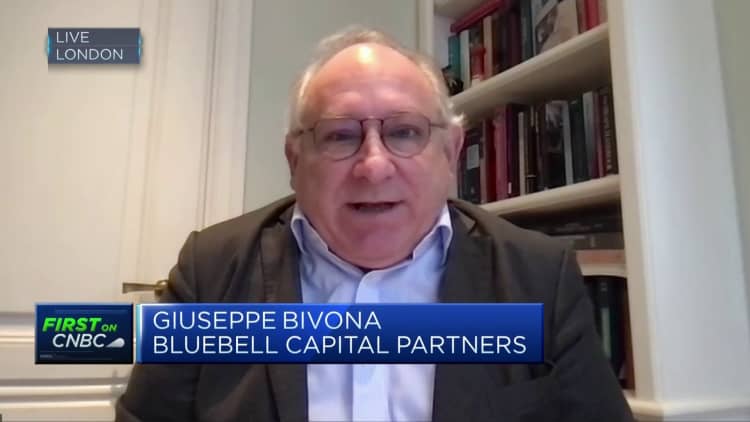BP in 2020 set out its ambition to become a net zero company “by 2050 or sooner.”
Matt Cardy | Getty Images News | Getty Images
Shares of BP rose 6% on Tuesday after the oil giant accelerated the pace of its buybacks and increased its dividend, despite a drop in annual profit.
The energy major increased the pace of its share repurchases, announcing intentions to execute a $1.75 billion share buyback prior to reporting first-quarter results. The company said it was committed to announcing a $3.5 billion share buyback for the first half of the year.
BP also announced a dividend per ordinary share of 7.27 cents for the final three months of 2023, marking a 10% increase compared to the same period in the previous year.
The oil giant posted underlying replacement cost profit, used as a proxy for net profit, of $13.8 billion for 2023, a steep fall from a record $27.7 billion in the previous year. Analysts had anticipated net profit of $13.9 billion for full-year 2023, according to an LSEG-compiled consensus.
BP declared fourth-quarter net profit of nearly $3 billion, beating analyst expectations of $2.6 billion.
As London-listed stock of the oil major soared toward the top of the pan-European Stoxx 600 index on Tuesday morning, analysts at RBC Capital Markets described BP’s commitment to share buybacks beyond the first quarter of 2024 as a “welcome positive surprise.”
They added that BP’s plan to execute share buybacks of at least $14 billion through 2025, subject to maintaining a strong investment grade rating, was likely not expected by the market.
“With BP putting out 2025 specific EBITDA targets, which are also above consensus expectations, the commitment on the payout front shows confidence in future delivery, we think,” RBC Capital Markets said in a research note. EBITDA refers to earnings before interest, taxes, depreciation and amortization.
“It seems that particularly oil investors right now are really responding to those shareholder returns,” Noah Brenner, executive editor at Energy Intelligence, told CNBC’s “Squawk Box Europe” on Tuesday.
“What BP has done is not only beat on the expected buyback over the next couple of quarters but given clarity to what that buyback — and this is a minimum amount of what that buyback will be — over the next couple of years. And that’s been a big sticking point with investors,” he added.
‘Real momentum’
BP said it’s fourth-quarter results reflected strong gas trading and “significantly lower” industry refining margins. Net debt for the period stood at $20.9 billion at the end of the 2023, compared with $21.4 billion at the end of 2022.
“Looking back, 2023 was a year of strong operational performance with real momentum in delivery right across the business,” BP CEO Murray Auchincloss said in a statement.
“We are confident in our strategy, on delivering as a simpler, more focused and higher-value company, and committed to growing long-term value for our shareholders.”
British rival Shell on Thursday reported stronger-than-anticipated full-year profits, announcing a 4% increase to its dividend and a fresh $3.5 billion share buyback program.
In the U.S., Exxon Mobil and Chevron both beat quarterly earnings expectations, although their results also fell sharply compared to a year ago amid weaker fossil fuel prices.
Strategy
BP’s latest results come as the company faces pressure from one activist investor over its strategy.
In a letter to BP Chair Helge Lund and then-interim CEO Murray Auchincloss in October, Bluebell Capital Partners urged the company to ramp up its oil and gas investments and reduce spending on clean energy. The letter was first reported by the Financial Times last week.
Bluebell Capital’s Giuseppe Bivona has since expressed his frustration with BP’s “totally underwhelming” share price performance relative to the firm’s U.S. and European peers. Bivona told CNBC’s “Squawk Box Europe” on Jan. 30 that BP should consider deploying its capital in a “rational way.”

In response to the publication of the letter, a spokesperson for BP at the time said that the company “welcomes constructive engagement” with its shareholders.
BP has also contended with a mediatized leadership change. The company appointed Murray Auchincloss as permanent CEO last month, roughly four months after his predecessor Bernard Looney resigned after less than four years on the job.
Under Looney’s leadership, BP promised its overall emissions would be 35% to 40% lower by the end of the decade.
The firm, which was one of the first energy giants to announce plans to cut emissions to net zero “by 2050 or sooner,” watered down these climate plans last year. BP said almost a year ago that it would instead target a 20% to 30% cut, noting that it needed to keep investing in oil and gas to meet demand.







